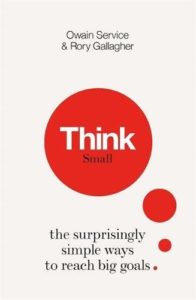The Behavioural Insights Team was created to help apply a more nuanced understanding of human behaviour to government policy, and to spread the understanding of behavioural science.
Governments across the globe are now using behavioural insights to make better policy.
But from the outset, we found that there has been interest not just in how behavioural insights can be applied to policy, but how it can be used to help all of us achieve important goals in our personal and work lives.
And that’s what this book is about. Our aim is to open up the behavioural insights tool box so that everyone can use these techniques to make better decisions at work, rest and play.
You will most likely be using some ‘self-nudges’ in your everyday life already – whether it’s setting your watch a few minutes early to help you keep to time, getting colleagues to commit to specific tasks at work, hiding away the cookie jar, or using treats to reward your kids for good behaviour.
This book aims to help you do this more systematically, through evidence-based techniques that you can use to help yourself and those around you.
The key message is that to reach big, we need to Think Small. So it is not about reining in your ambitions. It is about adopting a mindset that focuses on getting the small – and often simple – details right that will set you on the path to achieving your goals.
At the heart of the book is a framework, focused around seven simple steps:
- Set: choose the right goal for you, set a specific target, and break your long-term objective down into manageable steps.
- Plan: create simple rules and an actionable plan which links to your daily routine.
- Commit: make a commitment, write it down, make it public and appoint a commitment referee.
- Reward: put something meaningful at stake and use small rewards to stoke motivation, but beware of backfire effects.
- Share: draw on the help of others, tap into your social networks or form a group with a shared goal.
- Feedback: know how you’re tracking against your goal and seek out specific, actionable feedback
- Stick: practice with focus, test different approaches and celebrate success.
This is not a checklist. You do not have to religiously apply each of the seven tools to every goal, but as David Halpern says in the foreword, together they provide the ‘behavioural scaffolding’ that will support you to succeed.
We hope you enjoy reading the book and that by using this simple framework you’ll be able to choose and achieve goals that make the world a little better for you and those around you.
From today, you can buy Think Small: the surprisingly simple ways to reach big goals. We have also created a short animation that explains the core principles behind the book – watch it here.


